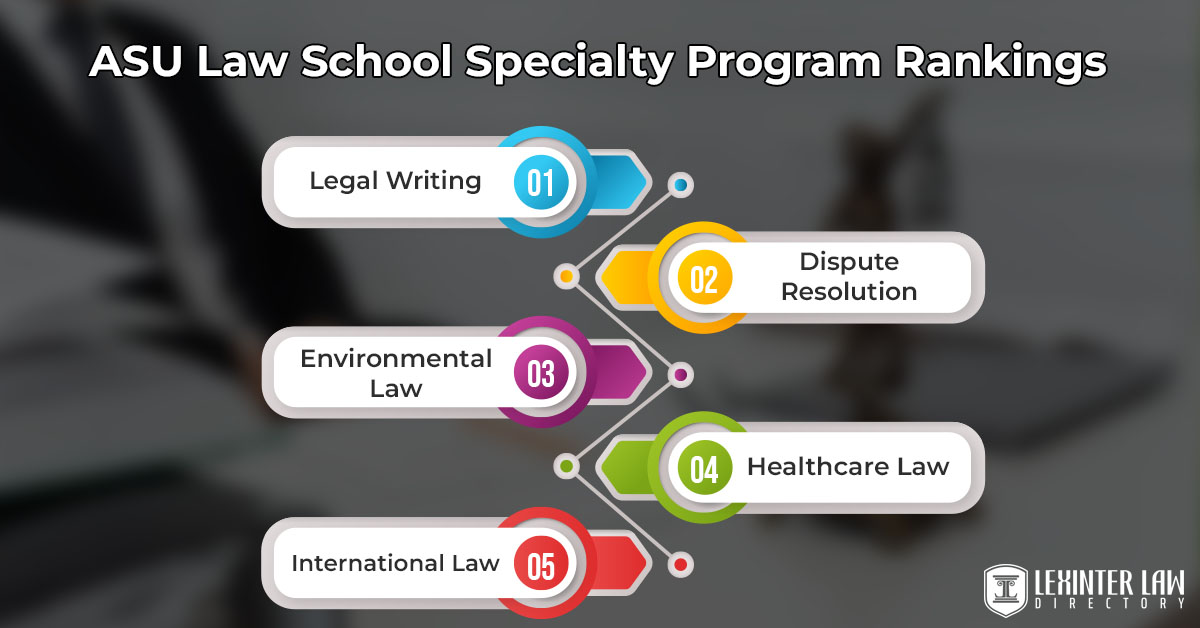ASU Law School – Things To Know
ASU Law School, officially known as the Sandra Day O’Connor College of Law at Arizona State University. It’s a renowned law school located in Phoenix, Arizona. Named after the first female Supreme Court Justice, Justice Sandra Day O’Connor, ASU Law School has established itself as a leading institution in legal education.
ASU Law School is known for its innovation, experiential learning opportunities, commitment to public service, and distinguished faculty. The law school is considered among the top law schools in Arizona. It equips students with the knowledge, skills, and connections necessary for a successful legal career.
Table of Contents
Academic Programs At ASU Law
Arizona State University’s Sandra Day O’Connor College of Law offers diverse academic programs tailored to various professional goals. The programs include the Juris Doctor, Master of Laws (LLM) for specialized legal training, Master of Human Resources and Employment Law (MHREL), and various programs. The programs offered by ASU Law emphasize theoretical knowledge and practical skills.
Juris Doctor (JD)
The Juris Doctor (JD) program at ASU Law is a comprehensive, three-year, full-time course of study designed to prepare students for legal practice. The first-year curriculum encompasses foundational subjects such as civil procedure, contracts, torts, legal method and writing, property, constitutional law, criminal law, legal advocacy, and professional responsibility. Students have the flexibility to select from various elective courses, enabling them to tailor their education to specific interests. Students must complete 88 credit hours to graduate and produce a substantial written paper. The program emphasizes academic rigor and practical experience, offering opportunities for interdisciplinary study and experiential learning to equip graduates for successful legal careers.
Master Of Laws (LLM)
The Master of Laws (LLM) program at ASU Law is a one-year, 24-credit-hour degree designed for individuals who have already completed a law degree. The program offers specialized legal training, allowing students to expand their legal knowledge or become experts in specific legal fields. ASU Law provides LLM degrees in areas such as Biotechnology and Genomics, Tribal Policy, Law and Government, and Global Legal Studies. The program is flexible, with fall and spring start dates, and offers full-time and part-time options. Applicants must have completed a JD degree or a law degree from a foreign institution that qualifies them to practice law.
Master Of Human Resources And Employment Law (MHREL)
The Master of Human Resources and Employment Law (MHREL) program at Arizona State University’s Sandra Day O’Connor College of Law is a 30-credit hour graduate degree. The program is tailored for entry-level and established non-lawyer professionals in human resources, recruitment, and operations. The program is available online or in person, and it provides a comprehensive understanding of the legal and regulatory frameworks. The frameworks focus on various employment practices, including recruitment, hiring, promotion, and termination. The MHREL program, moreover, enables graduates to apply for the SHRM Certified Professional (SHRM-CP) exam, a distinction recognized by employers in hiring and promoting HR professionals.
Master Of Legal Studies (MLS)
The Master of Legal Studies (MLS) program is a flexible, 30-credit hour graduate degree designed for individuals seeking to enhance their understanding of the U.S. legal system without becoming practicing attorneys. The program offers full-time and part-time enrollment options, with on-campus and online courses. Students choose from various unique emphases, including business law, criminal law, and intellectual property law, allowing them to tailor their studies to specific career goals. The MLS curriculum provides a strong legal foundation, emphasizing practical skills applicable across various industries.
Master Of Sports Law And Business (MSLB)
The Master of Sports Law and Business (MSLB) program is a comprehensive 36-credit hour degree that integrates legal and business aspects of the sports industry. The program is designed to be completed in one to two years. The curriculum includes 21 credits of required courses, 9 to 12 elective credits, and a 3 to 6 credit internship or applied project. The structure provides students with theoretical knowledge and practical experience. The program, moreover, offers opportunities for hands-on learning through internships and applied projects, preparing graduates for diverse careers in the sports sector.
Is ASU A Good Law School?

Arizona State University’s Sandra Day O’Connor College of Law is widely recognized as a good law school. It consistently ranks among the top law schools in the United States. It has an excellent reputation for its academic programs, faculty, and innovative approach to legal education.
ASU Law School’s commitment to experiential learning, interdisciplinary education, and practical skills development sets it apart. The school offers diverse concentrations and clinics, allowing students to gain hands-on experience and specialize in areas of interest. The emphasis on the real-world application of legal knowledge equips students with the skills needed to excel in their future legal careers.
The law school’s strong reputation is also bolstered by its renowned faculty. The faculty members at ASU Law School are accomplished legal scholars and practitioners actively engaged in research, teaching, and public service. Their expertise and guidance contribute to the high-quality education students receive. Furthermore, ASU Law School’s commitment to public service, pro bono work, and social impact sets it apart as an institution dedicated to making a positive difference in society.
The law school’s initiatives in these areas allow students to engage with the community and address legal issues affecting underserved populations. Additionally, the law school’s close ties to legal professionals and organizations and its strong alumni network offer valuable networking and career opportunities for students.
ASU Law School’s strong reputation, innovative programs, commitment to experiential learning, distinguished faculty, and focus on social impact make it a good law school choice for aspiring lawyers.
How Hard Is ASU Law To Get Into?
Admission to Arizona State University’s Sandra Day O’Connor College of Law (ASU Law School) is competitive, as with most reputable law schools. The difficulty of getting into ASU Law School can vary yearly based on the applicant pool and the number of available seats in the incoming class.
It’s important to note that the admissions process considers multiple factors, including undergraduate GPA, LSAT scores, letters of recommendation, personal statements, work experience, and extracurricular activities.
The admissions committee at ASU Law School seeks to build a diverse and talented class, and they assess applicants holistically, considering both academic achievements and non-academic qualities.
To maximize your chances of admission, you should have a solid academic record, a competitive LSAT score, and a well-rounded application that highlights your strengths, experiences, and commitment to the legal field.
It’s also essential to thoroughly research ASU Law School’s admissions criteria and requirements and to follow the application instructions closely.
Read a related blog about SJ Quinney College Of Law.
What GPA Is Required For ASU Law School?
Applicants should have earned a bachelor’s degree from an accredited institution and have a GPA typically at or above the 85th percentile of their graduating class. This suggests that a GPA higher than 3.5 or above is generally considered competitive.
It is important to note that GPA is just one factor in the admissions process. ASU Law School takes a holistic approach, considering multiple factors.
When evaluating applicants, such as LSAT scores, letters of recommendation, personal statements, work experience, and extracurricular activities. It’s recommended to strive for a strong academic record but also to focus on preparing a well-rounded application that showcases your strengths, experiences, and passion for law.
ASU Law School Acceptance Rate

The acceptance rate for Arizona State University’s Sandra Day O’Connor College of Law (ASU Law School) for the class of 2023 was approximately 32.54%. Out of 1,337 applicants, 435 were offered admission, and 101 enrolled as full-time students. This indicates a competitive admissions process with a relatively low acceptance rate.
Remember, the acceptance rates can vary from year to year and may be influenced by factors such as the size of the applicant pool and the qualifications of the applicants.
Check out the Crucial Facts about Lewis And Clark Law School.
ASU Law School Tuition
The tuition rates for Arizona State University’s Sandra Day O’Connor College of Law (ASU Law School) for the academic year 2022-2023 are as follows:
In-State Resident
- Full-time: $27,464 per year
- Part-time: Not available
Non-Resident
- Full-time: $47,670 per year
- Part-time: Not available
It’s important to note that these figures represent tuition costs only and do not include additional fees, living expenses, or other associated costs.
Financial Aid At ASU Law
ASU Law provides extensive financial aid options, including merit-based scholarships, need-based grants, and access to external funding opportunities. Work-study programs offer part-time employment for eligible students, supporting educational expenses while gaining practical experience.
Scholarships And grants available
ASU Law offers various scholarships and grants to support its students. All first-year students are automatically considered for merit-based scholarships, with additional opportunities available upon enrollment. Students must remain in good academic standing and be enrolled full-time to maintain awarded scholarships. The college also provides access to external scholarships through platforms like ScholarshipUniverse, which matches students with relevant opportunities. The ASU Law Advance Program offers a $2,000 stipend to cover the expenses of the first year of law school. Need-based grants are available as well for eligible students who complete the Free Application for Federal Student Aid (FAFSA) by the priority filing date.
Work-Study Opportunities
Arizona State University Law School offers work-study opportunities through the Federal Work-Study (FWS) Program, a federally funded initiative that provides part-time employment to students with financial need. Eligible students work up to 20 hours per week, earning wages to assist with educational expenses. Positions are available on-campus and with approved off-campus employers, including community service organizations. Students must complete the Free Application for Federal Student Aid (FAFSA) and indicate interest in work-study employment. The program offers financial assistance and valuable work experience relevant to students’ academic and career goals.
ASU Law School Ranking
| Category | Ranking | Category | Ranking |
|---|---|---|---|
| Best Law Schools | 32 (tie) | Environmental Law | 24 (tie) |
| Part-time Law | 21 (tie) | Health Care Law | 22 (tie) |
| Business/Corporate Law | 30 (tie) | Intellectual Property Law | 27 (tie) |
| Clinical Training | 16 (tie) | International Law | 17 (tie) |
| Constitutional Law | 28 (tie) | Legal Writing | 8 (tie) |
| Contracts/Commercial Law | 38 (tie) | Tax Law | 35 (tie) |
| Criminal Law | 34 (tie) | Trial Advocacy | 28 (tie) |
| Dispute Resolution | 25 (tie) |
Arizona State University’s Sandra Day O’Connor College of Law (ASU Law School) has consistently achieved strong rankings in various publications. Here is information about ASU Law School’s ranking based on the U.S. News & World Report’s annual survey of graduate schools:
Overall Ranking
The overall ranking for ASU Law School in the 2023-24 U.S. News & World Report rankings is 32 (tie). This means that ASU Law School is ranked among the top 32 law schools in the country. This recognition places it among the highly regarded institutions in legal education.
Public Law School Ranking
According to U.S. News & World Report, ASU Law School is ranked 9th among public law schools in the 2023-2024 rankings. This is a significant achievement, as ASU Law School is a relatively young law school founded in 1965. This ranking highlights its standing as a leading public institution in legal education.
Specialty Program Rankings

ASU Law School has excelled in various specialty program rankings, showcasing its strengths in specific areas of law. Some notable rankings include:
Legal Writing
ASU Law School consistently ranks as one of the top legal writing schools in the country. In recent rankings, it was ranked 8 (tie) in the specialty of legal writing.
Dispute Resolution
The law school is ranked 25 (tie) in the specialty of dispute resolution, highlighting its expertise in alternative dispute resolution methods.
Environmental Law
ASU Law School is ranked 24 (tie) in the specialty of environmental law, showcasing its focus on sustainability and environmental legal issues.
Healthcare Law
The law school is ranked 22 (tie) in the specialty of healthcare law, emphasizing its expertise in this complex field.
International Law
ASU Law School is ranked 17 (tie) in the specialty of international law, reflecting its global perspective and engagement.
Career Opportunities And Support
ASU Law offers extensive career opportunities and support through its Career Services Office, providing personalized counseling, job boards, and workshops. Students gain hands-on experience via internships, externships, and clinics. The school, therefore, boasts a strong alumni network and high Bar exam pass rates.
Career Services And Counseling
The Career Services Office at ASU Law offers comprehensive support to students and alumni, facilitating successful legal careers. Services include personalized career counseling, resume and cover letter reviews, interview preparation, and access to an extensive online job board. Students engage with career advisors from the first day of law school to develop tailored career strategies, participate in workshops, and connect with potential employers. The proactive approach ensures graduates are well-prepared to enter the legal profession. The process, moreover, helps them learn the necessary skills and professional networks to achieve their career objectives.
Internship And Externship Programs
ASU Law offers robust internship and externship programs that provide students with practical legal experience in real-world settings. The programs enable students to work closely with esteemed lawyers and judges, enhancing their legal education beyond the classroom. Externships are with judicial, government, and nonprofit organizations, allowing students to engage in advanced legal work under the supervision of licensed attorneys. Students earn academic credit for their externship work, with one credit awarded for every 55 hours of legal work completed, up to a total of 12 credits during law school. ASU Law, moreover, offers unique opportunities for students to gain legal experience in Washington, D.C., and Los Angeles through specialized externship programs.
Strong Alumni Network Connections
Arizona State University Law boasts a robust alumni network exceeding 11,000 graduates across various degree programs. The extensive community offers current students and fellow alumni valuable opportunities for mentorship, networking, and career advancement. Notable alumni include Barbara Barrett, former U.S. Ambassador to Finland and U.S. Secretary of the Air Force; Doug Ducey, former Governor of Arizona; and Kevin Warren, Chief Operating Officer of the Minnesota Vikings. The achievements of the alumni underscore the network’s influence and the diverse career paths accessible to ASU Law graduates.
High Bar Exam Pass Rates
Arizona State University Law consistently achieves high Bar exam pass rates, surpassing state and national averages. ASU Law first-time test takers achieved a passage rate of 90.1%, an improvement from 88% the previous year. ASU Law, moreover, leads in overall Bar passage rates, outperforming the state average by 7.3% and the nearest Arizona law school by 13.7%. The school’s full-time employment rate is 89.1% within 10 months of graduation. The success reflects the college’s rigorous academic programs and comprehensive Bar preparation resources, effectively equipping graduates for legal practice.
FAQs
1. Is ASU A Good Law School?
Arizona State University’s Sandra Day O’Connor College of Law is highly regarded, ranked as the #12 Best Public Law School and #32 overall by U.S. News & World Report in 2024. With a low student-to-faculty ratio, diverse degree programs, and high employment rates, it provides quality education and promising career prospects for its graduates.
2. Is It Hard To Get Into ASU Law School?
Yes, it is hard to get into ASU Law School. With an acceptance rate of 19.65%, it is one of the most selective law schools in the country. The median LSAT score for admitted students is 166, and the median GPA is 3.84. This means that most students admitted to ASU Law School have scored in the top 30% on the LSAT and have a GPA of at least 3.8.
3. What LSAT Score Do I Need For ASU Law?
The median LSAT score for admitted students at ASU Law School is 166. This means that half of the students who are admitted to ASU Law School scored higher than 166 on the LSAT, and half scored lower. However, the LSAT score range for admitted students is quite broad, ranging from 148 to 179.
4. Why Is ASU Law Ranked So High?
ASU Law School is highly ranked due to its comprehensive curriculum, exceptional faculty, and strong employment outcomes for graduates. It offers a low student-to-faculty ratio, enhancing personalized learning and interaction. Additionally, the school is noted for its diverse specialties, including technology and health law, contributing to its prestigious standing in legal education.
Conclusion
Arizona State University’s Sandra Day O’Connor College of Law (ASU Law School) is a prestigious institution that offers a rich and innovative legal education experience. From its strong reputation and rankings to its commitment to experiential learning and social impact, ASU Law School is a top choice for aspiring legal professionals.
ASU Law School is a distinguished institution that combines tradition, innovation, and social impact to provide a comprehensive legal education experience. It is a place where aspiring lawyers can thrive, grow, and make a meaningful difference in the legal profession and the communities they serve.
Are you interested to know about the Law Facts? You can read this blog about Concordia University School of Law- Facts.

